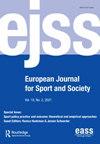Imagining the nation through football: German national self-stereotypes before, during and after the 2016 UEFA championship
IF 1
Q2 HOSPITALITY, LEISURE, SPORT & TOURISM
引用次数: 4
Abstract
Abstract Previous research has shown that consuming media broadcasts of national athletes participating in international sporting competitions can inspire national pride and heighten identification with the nation. Extending these accounts, this paper asks whether major sporting events can also shape meanings attached to the nation; specifically how strongly certain traits and characteristics are associated with the collective. Since prior research shows that TV broadcasts of international sporting competitions prioritise their own nation’s athletes and frequently draw on national stereotypes in their commentary, we hypothesise that these sportscasts have the potential to heighten the association of the nation with national stereotypes in TV viewers. Using large-scale, representative panel data from Germany, the paper tests these assumptions. Findings demonstrate that German TV viewers associated their nation more strongly with characteristics like achievement, diligence and solidarity during the 2016 UEFA football championship than at a baseline assessment about four weeks earlier. We find more pronounced effects among certain football-affine groups, who are socially and emotionally more strongly involved. Even two months after the conclusion of the event, a stronger association of the German nation with these particular traits was detectable in these groups, lending support to the notion that effects are more than just a short-term by-product of national euphoria.通过足球想象这个国家:2016年欧洲杯之前、期间和之后的德国民族自我刻板印象
摘要先前的研究表明,消费参加国际体育比赛的国家运动员的媒体广播可以激发民族自豪感,增强对国家的认同感。扩展这些叙述,本文询问重大体育赛事是否也能塑造国家的意义;特别是某些特质和特征与集体的联系有多紧密。由于先前的研究表明,国际体育比赛的电视转播优先考虑本国运动员,并在评论中经常利用民族刻板印象,我们假设这些体育转播有可能在电视观众中加深国家与民族刻板印象的联系。本文使用来自德国的大规模、有代表性的面板数据,对这些假设进行了检验。调查结果表明,与大约四周前的基线评估相比,德国电视观众在2016年欧洲足联足球锦标赛期间更强烈地将自己的国家与成就、勤奋和团结等特征联系在一起。我们发现,某些足球仿射群体的影响更为明显,他们在社会和情感上的参与更为强烈。即使在活动结束两个月后,在这些群体中也可以发现德意志民族与这些特殊特征之间有着更紧密的联系,这支持了这样一种观点,即影响不仅仅是民族愉悦的短期副产品。
本文章由计算机程序翻译,如有差异,请以英文原文为准。
求助全文
约1分钟内获得全文
求助全文
来源期刊

European Journal for Sport and Society
HOSPITALITY, LEISURE, SPORT & TOURISM-
CiteScore
3.30
自引率
4.20%
发文量
17
 求助内容:
求助内容: 应助结果提醒方式:
应助结果提醒方式:


